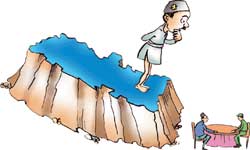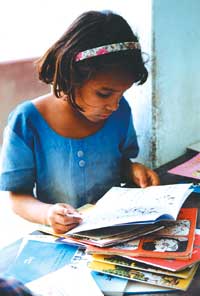 As he wings his way back from the World Bank meeting in Washington, Finance Minister Prakash Chandra Lohani must be heaving a sigh of relief. He managed to persuade bank directors that Nepal should get the first tranche of crucial budget support worth $70 million. But it wasn't easy.
As he wings his way back from the World Bank meeting in Washington, Finance Minister Prakash Chandra Lohani must be heaving a sigh of relief. He managed to persuade bank directors that Nepal should get the first tranche of crucial budget support worth $70 million. But it wasn't easy. Donor governments led by the Europeans raised serious doubts about the country's ability to address poverty and development goals in the absence of electoral representation or a genuine move towards a negotiated solution to the insurgency.
In the end, donors agreed to go along with the Country Assistance Strategy (CAS) and approved the soft credit package to implement Nepal's Poverty Reduction Strategy which aims to reduce the number of people living below the poverty line from 40 to 30 percent by 2007.
In a toughly-worded statement issued simultaneously with the Bank announcement from Washington on Wednesday afternoon, Kathmandu-based donor missions from Canada, Britain, France, Germany, Denmark, Norway, Switzerland and the Netherlands said they had approved the package reluctantly, and laid out strict conditions for the next slice of the multi-year program support.
"We want to emphasise that our approval of the loan does not signify an endorsement of the current absence of representative democracy in Nepal," the donor communique clarified pointedly. And they listed their main concerns:
. Lack of democratic representation at the national and local levels.
. The threat to reforms caused by this democratic vacuum and constitutional crisis.
. The resumption of violence.
. A rapidly deteriorating human rights situation.
"We felt that we had to come out strongly before the meeting to say what had to be said," one Kathmandu-based donor representative told us. "We are very worried about the situation here, things are sliding."
Wednesday's statement by the World Bank, which is not allowed to be as blunt as the bilaterals, praised the government's financial sector reforms, the transfer of education and health care to communities and the anti-corruption drive. However, the World Bank's representative in Nepal, Ken Ohashi, did refer to the concerns of his Kathmandu-based development partners and admitted: "Failure to achieve a negotiated resolution to the conflict, restore democratic institutions based on participation and accountability, and strengthen protection of human rights will pose serious risks to economic development efforts and severely limit the ability to achieve poverty reduction."
 The Bank says Nepal's poverty reduction strategy is a homegrown program that recognises the structural problems of social exclusion and governance. It believes that addressing these challenges demand transparency and devolution of decision-making to the local level. While acknowledging these priorities, the other donors have been much more categorical .
The Bank says Nepal's poverty reduction strategy is a homegrown program that recognises the structural problems of social exclusion and governance. It believes that addressing these challenges demand transparency and devolution of decision-making to the local level. While acknowledging these priorities, the other donors have been much more categorical . "I think the government knows that unless the concerns of democratic restoration, steps towards a negotiated solution and human rights are addressed, there will be no more budget support in future," said another development aid official in Kathmandu.
When asked for their reaction, one government official told us the message from the donors has come through loud and clear and has gone "to the highest levels". However, he said the government and security forces have decided that peace is a prerequisite for poverty reduction. After two previous ceasefires, which the Maoists used to extract concessions from the government and buy time, the security forces seem to want to turn the screws and force the Maoists to return to the negotiating table. "We are not going to fall into that trap again," the official added.
In a statement this week, the United States embassy in Kathmandu acknowledged there is "overwhelming support within Nepal and the international community" for a negotiated settlement. "The United States continues to believe that the conflict can only be settled by peaceful means," the statement added. "We urge the Maoists to restore the ceasefire and resume the negotiation process."
The Americans say their position is not that divergent from the rest of the donors, adding that they think it would be naive to believe that the Maoists are going to return to the negotiating table without considerable military pressure. However, other Kathmandu-based donor groups strongly disagree.
"The Americans think an Iraq approach will work here, it hasn't worked in Iraq, it won't work here," said one donor official. "The Maoists have time on their side, they will only talk from a position of strength. It is a fallacy to believe that they will talk when they are weak."
This divergence appears to be the reason that the Maoists have singled out 'American imperialism' for special vitriol in statements, online postings and graffiti all over the country. "The Maoists know it is only the Americans who stand in their way," said another government official. Ironically, India, which equipped the Royal Nepali Army with more military hardware in the past two years than the Americans, is not even mentioned in the Maoist communiques.
The renewed polarisation between the palace the and parties has worried Kathmandu-based diplomats, most of whom firmly believe that the first order of business is for the constitutional forces to unite so that a negotiated resolution to the conflict can start. "We believe that a united body politic is essential to provide and find a long lasting solution to the conflict," said British ambassador Keith Bloomfield in an interview. "Such a body politic can tackle the underlying causes and negotiate a constructive and comprehensive way forward with the Maoists."
Other diplomats who were interviewed for this article but did not want to be named, were worried by the political stalemate and especially with the prospect of an alliance between the parties and the Maoists against the monarchy. Maoist leader Prachanda had sent out a feeler to the political parties in a statement last week in which he asked them not to doubt his group's commitment to multiparty democracy. Reports of UML leader Madhab Nepal meeting Maoist leaders have raised eyebrows here, not least because of the venue being Lucknow. One diplomat summed up that scenario: "An alliance between the parties and the Maoists would be a disaster."


